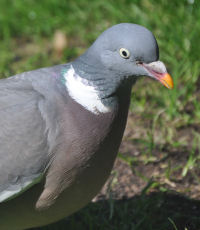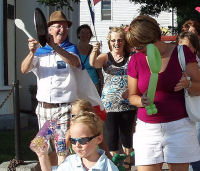Tintamarre
It’s a pleasant word for an unlovely experience, unless you are a lover of loud noises, since a tintamarre is an uproar, hubbub or confused noise.
The tempest had struck. Kenton, climbing, heard thunderings like the clashing of armied shields; clanging of countless cymbals, tintamarre of millions of gongs of brass.
The Ship of Ishtar, by Abraham Merritt, 1926. Armied is a rare word meaning “army-like” or “forming an army”.

Listen out for noisy night-time hunters
The 2010 tintamarre in Fredericton, Canada. Photo: Bernadette Regnier
It was borrowed from French in the sixteenth century. The Dictionnaire Historique de la Langue Française says it was derived (about 1470) from the older French word tinter (to ring a bell) by adding an obscure ending. It says it originally meant a noise made by hitting something but that it especially referred to a way of hunting wood pigeons in the middle of the night by confusing the birds with the sound of drums and pans. It adds that the modern sense of a loud noise accompanied by confusion and disorder is attributed to François Rabelais in 1546. Tinter is from Latin tinnīre, to ring or jingle, a close relative of tintinnābulum, a bell, from which English gets tintinnabulation.
At one time, tintamarre was fairly common in English but it almost died out in the nineteenth century. J Redding Ware noted in his Passing English of the Victorian Era in 1909 that it was confined to Devon. Since then it has become even rarer, though it has been resurrected, hopefully teasingly, for an annual music festival in Lincolnshire.
The French connection survives in the Acadian regions of eastern Canada. A tintamarre is a colourful parade in which participants see how much din they can create using any noisemaker to hand, such as pots, pans, whistles or drums, usually in celebration of National Acadian Day. This event is only about 30 years old (one website calls it a modern tradition) but may reflect the old French custom of charivari.

